Overview
This article offers a compassionate look at respite care, defining it as a short-term service designed to provide temporary relief for primary caregivers. We understand that caregiving can be overwhelming, and respite care allows caregivers to recharge while ensuring their loved ones receive the necessary support.
Research shows that respite care significantly reduces caregiver burnout, enhances emotional well-being, and improves the overall quality of life for both caregivers and care recipients. This highlights its essential role in the caregiving dynamic, offering not just relief but a renewed sense of purpose.
In addition, consider how respite care can transform your caregiving experience. Imagine a moment where you can take a break, knowing your loved one is in good hands. We’re here for you, and your comfort is our priority. Let us help you navigate this journey with care and understanding.
Introduction
In a world where the demands of caregiving can often feel overwhelming, respite care stands as a beacon of hope for both caregivers and their loved ones. This essential service offers temporary relief, allowing primary caregivers the chance to take much-needed breaks while ensuring that those they care for continue to receive the support they need. With options ranging from in-home assistance to specialized facilities, respite care is designed to be flexible and tailored to individual circumstances.
As the landscape of caregiving evolves, it becomes crucial for families to understand the myriad benefits and types of respite care available. We’re here to support you in finding balance and well-being throughout your caregiving journey. Remember, your comfort is our priority, and the right respite care can make all the difference.
What is Respite Care? A Comprehensive Overview
The respite care definition refers to an essential short-term service designed to provide temporary relief for primary providers, allowing them to take much-needed breaks from their demanding responsibilities. This form of assistance ensures that cherished individuals continue to receive the vital support they need during the provider’s absence. Temporary support can be arranged for various lengths—ranging from a few hours to several weeks—tailored to the specific needs of both the caregiver and the individual receiving help.
At Best Care Nurses Registry, we offer personalized temporary support services that are flexible and adaptable to fit the unique situations of each family. Our in-home support providers offer companionship and help with daily activities, ensuring that individuals of all ages receive compassionate assistance in the comfort of their own homes. This adaptability makes temporary support an appealing choice for families seeking help while maintaining the quality of service for their loved ones.
One of the key advantages of temporary support is its flexibility; it can be provided in various environments, including the comfort of home, adult day programs, or specialized residential facilities. Recent statistics highlight the significance of temporary support, with roughly 40% of those providing assistance reporting enhanced well-being after utilizing these services. In fact, a study by the Corporation for National and Community Service found that approximately 40% of individuals who rated their health as fair or poor before receiving temporary relief now consider their health as good.
Moreover, families that engage in respite services often experience lower stress levels and improved social connections, aligning with the respite care definition, as they gain access to vital resources and support networks.
As we look ahead to 2025, the realm of respite services continues to evolve, with effective programs emerging that specifically address the needs of family providers. These programs not only provide assistance but also connect support providers with essential services such as food, clothing, and shelter, addressing the broader challenges they face. For example, there are 5.5 million supporters for military personnel in the U.S., many of whom encounter significant health challenges and lack health insurance.
As the demand for relief support grows, understanding the respite care definition and its benefits becomes increasingly important for caregivers striving for balance in their lives. Furthermore, an external assessment by Auburn University found that families utilizing respite services reported lower stress, a greater understanding of parenting and child development, strengthened social ties, and improved access to tangible supports during times of need.
To explore how Best Care Nurses Registry can assist you in creating a customized home health solution, please call us at (888) 203-2529 to speak with our friendly staff. We are here to discuss your needs and help you develop a personalized support plan that perfectly suits your situation.
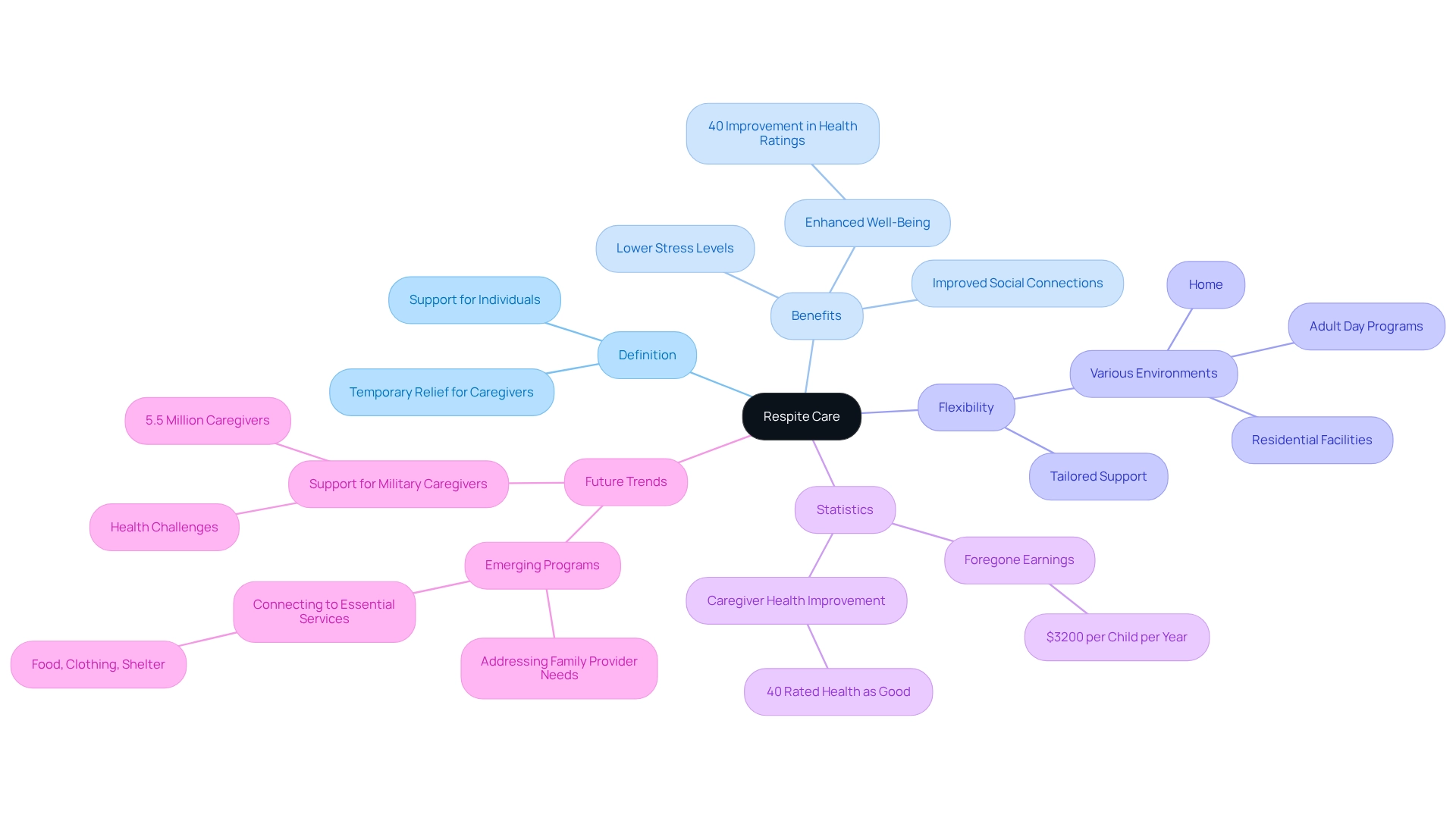
Types of Respite Care Services: In-Home, Out-of-Home, and More
The definition of respite care encompasses various choices designed to support caregivers and their families. These services can be categorized as follows:
-
In-Home Respite Assistance: This service allows providers to visit your home, offering essential support that enables primary caregivers to take a well-deserved break, all while ensuring their loved ones remain comfortable in familiar surroundings. With Best Nurses Registry, you can rest easy knowing that your loved one is safe and happy in the hands of skilled professionals. This approach has been shown to significantly enhance the emotional well-being of both caregivers and recipients. A systematic review in the Journal of Community Health Nursing highlights a 25% increase in anxiety and depression scores among patients receiving personalized home support.
-
Out-of-Home Respite Support: This category includes adult day centers where recipients can engage in enriching activities and receive assistance throughout the day. These centers not only provide vital support but also foster social interaction, which can be incredibly beneficial for the emotional health of participants. Notably, Iowa offers group relief services at a ratio of one staff member for every two or more individuals receiving support, enhancing the assistance available in these environments.
-
Facility-Based Relief Services: For individuals needing more intensive support, short-term stays in assisted living or nursing homes offer comprehensive assistance. This option is particularly valuable for families seeking temporary relief while ensuring their loved ones receive professional attention. Best Care Nurses Registry guarantees that caregivers are thoroughly vetted and committed to excellence, providing reassurance for families.
-
Emergency Respite Assistance: This type of support is designed for unexpected situations, enabling caregivers to arrange prompt help swiftly. It serves as an essential resource for families facing unforeseen challenges, ensuring that support needs are met without delay.
Choosing between in-home and external services often hinges on personal preferences and the specific respite care definition that best aligns with individual circumstances. Recent statistics reveal a growing inclination towards in-home services, as they facilitate a more personalized experience. However, out-of-home options also present distinct benefits, including organized activities and social interaction, which can enhance the quality of life for those receiving assistance.
As we look towards 2025, the landscape of temporary support continues to evolve, with an increasing emphasis on flexibility and accessibility. Initiatives like Washington State’s Medicaid Transformation Project illustrate innovative approaches to temporary relief, focusing on support services that address unmet needs for daily living activities. As Wilfried Guets noted, this research carries significant health policy implications for the current aging population crisis in OECD nations, underscoring the urgent need for effective support solutions to mitigate caregiver fatigue.
As the demand for relief services rises, understanding the definition of respite care and the various types available will empower families to make informed choices that best suit their needs. Best Nurses Registry is here to assist you in navigating these options and providing the support you require.
Additionally, Best Nurses Registry offers flexible payment options to ensure our services are accessible to everyone. We accept payments from various sources, including long-term support insurance, private pay, and more.
For more information or to schedule a consultation, please contact Best Care Nurses Registry at (888) 203-2529.
We are here to support you in discovering the optimal assistance options for your loved ones.
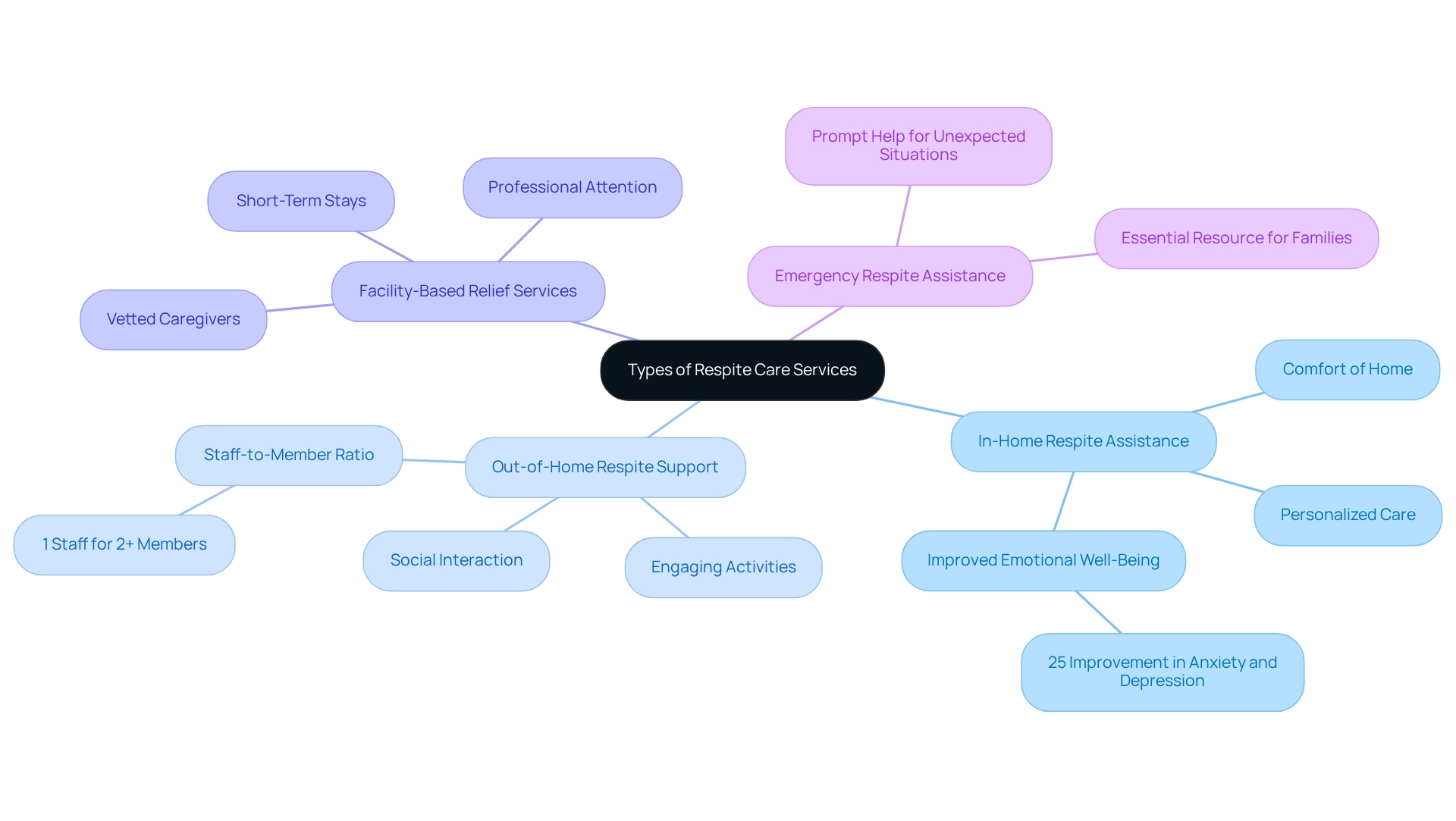
The Benefits of Respite Care: Supporting Caregivers and Recipients
The advantages of respite support, as outlined in the respite care definition, significantly enhance the well-being of both caregivers and care recipients. Key benefits include:
-
Preventing Caregiver Burnout: Regular breaks are essential for caregivers. They allow individuals to recharge and effectively manage stress. This proactive approach helps reduce the risk of burnout, a concern that affects many support providers. Studies reveal that burnout rates among caregivers are alarmingly high, leading to negative health outcomes from prolonged stress. A case study titled ‘Changes in Health Indicators Among Support Providers’ highlights that caregivers often face significant health challenges, with 13 out of 19 health indicators being unfavorable for them. Incorporating the respite care definition into their routines can improve these health metrics.
-
Enhancing Quality of Service: When providers take time off, care recipients benefit from the expertise of trained professionals. Best Care Nurses Registry refers compassionate providers who ensure that individual needs are met, leading to better health results and overall satisfaction. This professional support is especially vital for those with complex medical needs.
-
Enhancing Family Relationships: Taking a step back from caregiving duties allows individuals to reconnect with family and friends, fostering healthier relationships. This time away can rejuvenate personal connections, which are often strained under the pressures of caregiving. Veronica Yepez’s experience balancing full-time work with caregiving for her father illustrates the importance of mutual support and the role of laughter as a stress-relief method.
-
Promoting Independence: Respite support encourages recipients to engage with various providers and settings, enhancing their sense of autonomy. With Best Care Nurses Registry’s personalized approach, recipients can enjoy interactions that not only help preserve their independence but also enrich their social experiences, positively impacting their mental and emotional well-being.
The significance of the respite care definition cannot be overstated, particularly given recent findings that show one in five U.S. adults are caregivers, often facing considerable health challenges themselves. Additionally, the average family support for someone over 50 spent $5,531 annually on out-of-pocket caregiving expenses in 2007, underscoring the financial burden they carry. By incorporating relief support into their schedules, caregivers can improve their own health metrics while ensuring their family members receive top-notch, individualized attention.
As AARP’s Yeh observes, ‘Individuals with a sense of purpose generally look after themselves more effectively — and may even have a longer lifespan,’ highlighting the emotional and psychological benefits of respite support for caregivers.
Best Care Nurses Registry also offers pet-friendly services, ensuring that your loved ones can enjoy the companionship of their pets while receiving support. To engage with Best Care Nurses Registry, follow these three simple steps:
- Call to speak with our friendly staff to discuss your needs and answer any questions you may have.
- We’ll discuss your circumstances with you or your family member and obtain a plan from your physician that ideally addresses your requirements.
- We will refer compassionate support providers whom you choose to work with.
A brighter future for your loved one and your family is just a phone call away. CALL (888) 203-2529 to schedule a call.
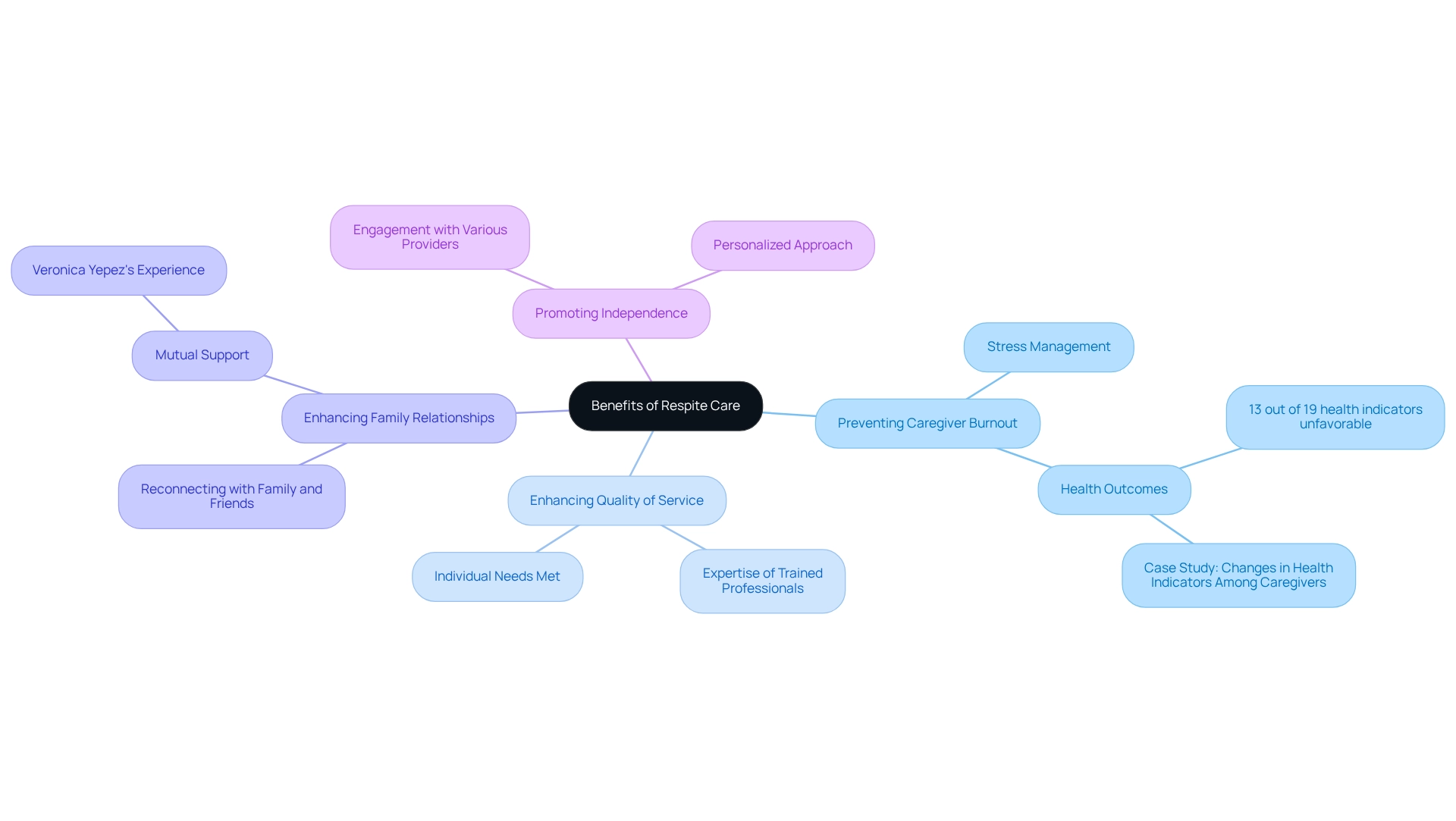
Who Needs Respite Care? Assessing Your Eligibility and Needs
Establishing the necessity for relief support begins with a thoughtful evaluation of both the provider’s and the recipient’s situations. It’s essential to consider several key factors:
- Caregiver Stress Levels: If feelings of overwhelm or exhaustion are frequent, it may indicate a pressing need for respite care. Research shows that individuals who devote substantial time—up to 100 hours each year—can experience lower health risks, highlighting the significance of self-care in caregiving roles. AARP’s Yeh notes that “individuals with a sense of purpose generally look after themselves more effectively — and may even have a longer lifespan,” underscoring the importance of caregivers prioritizing their well-being.
- Recipient’s Needs: Assess whether your loved one has complex medical requirements that exceed your ability to manage independently. This is particularly crucial for individuals with conditions such as Alzheimer’s, Parkinson’s, or other chronic illnesses, where additional support can greatly enhance their quality of life. Families often seek guidance on indicators that suggest the need for home assistance, such as difficulties with daily tasks or emerging health issues. Specific indicators for CNA/HHA services include challenges with personal hygiene, dressing, cooking, cleaning, or managing medications.
- Duration of Support: Long-term caregiving scenarios often require regular breaks to maintain the provider’s health and well-being. Continuous caregiving without breaks can lead to burnout, making it essential to incorporate periods of relief.
- Financial Considerations: Evaluate your budget and explore various financing options for support services. Understanding the financial implications can help you make informed decisions regarding the extent of assistance needed.
In 2025, many caregivers are considering temporary assistance as a viable option to alleviate stress and enhance their overall well-being. Recognizing the signs that indicate the need for respite care is crucial. Geriatric support managers frequently recommend that caregivers look for signs like increased irritability, exhaustion, and feelings of isolation, which may signal the need for a break.
Moreover, recent findings suggest that unpaid caregivers are 3.33 times more likely to report substance use as a coping mechanism, highlighting the pressures faced by caregivers and the importance of temporary relief in addressing these challenges.
A real-world example can be seen in the case of Veronica Yepez, who has taken on the role of caregiver for her 74-year-old father, Manuel Zavala Rodriguez, who suffers from multiple debilitating illnesses, including dementia. Despite the challenges, the family finds joy and purpose in caregiving, often using laughter as a stress-reliever. They maintain a strong sense of mutual love and support, which helps them cope with the emotional toll of caregiving.
Yepez emphasizes that the most rewarding aspect of their situation is knowing they are all there for her father, even as his health declines.
Ultimately, both providers and recipients of assistance can benefit from respite care, which fosters a healthier balance in support dynamics. By proactively evaluating these factors, caregivers can ensure they are offering the best possible support while also attending to their own needs. For personalized support consultation and compassionate caregiver matching, consider reaching out to Best Care Nurses Registry to develop a tailored home health service solution.
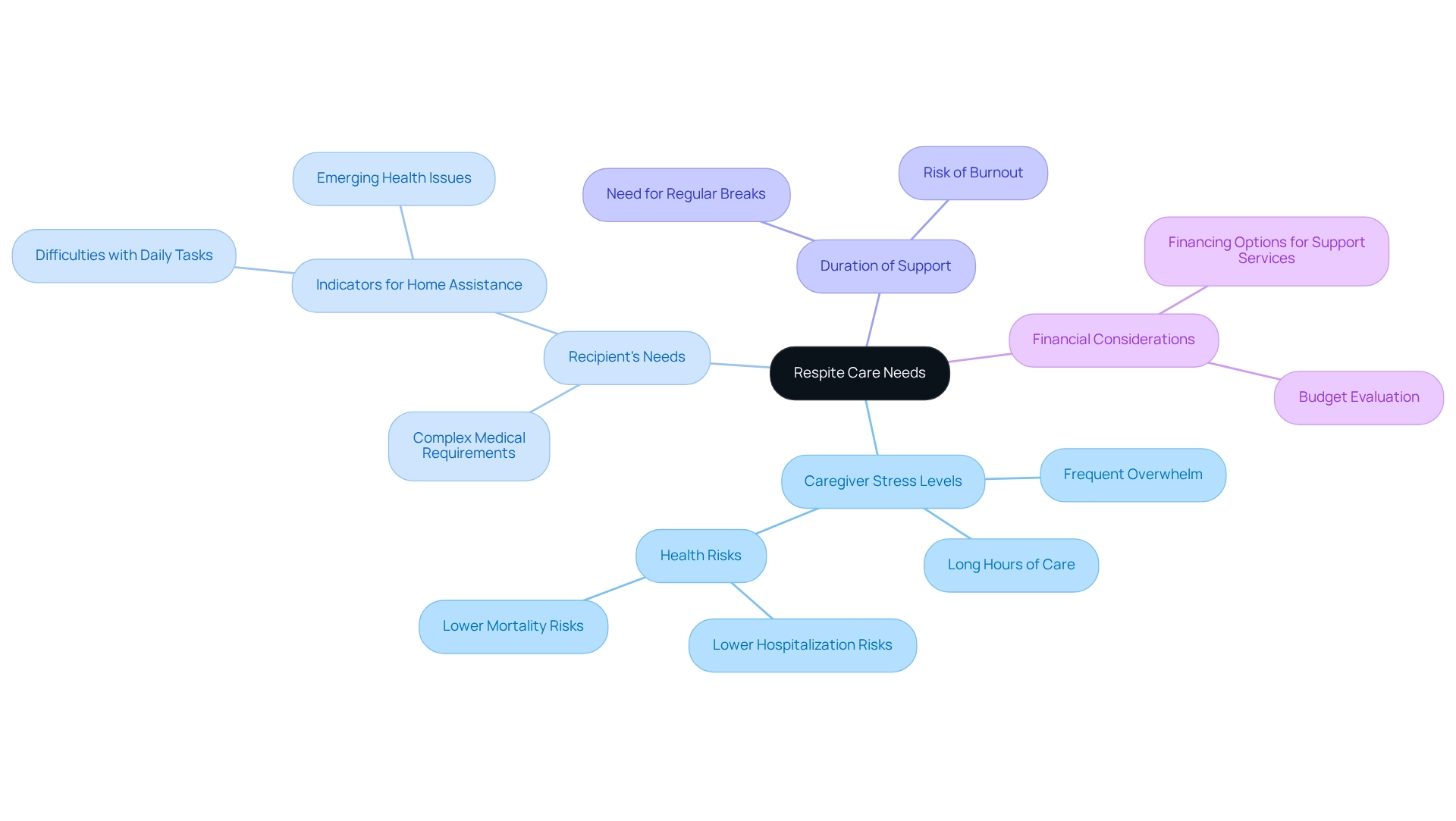
How to Find and Choose Respite Care: A Step-by-Step Guide
Identifying and selecting the appropriate respite service provider involves several crucial steps that can significantly impact the quality of assistance your loved one receives.
Identify Your Needs: Begin by evaluating the specific type of support needed. Consider factors such as the duration of support, the level of assistance required, and any personal preferences regarding caregiver characteristics, like gender or experience. Understanding whether your loved one requires a Certified Nursing Assistant (CNA) for medical tasks or a Home Health Aide (HHA) for personal assistance can greatly inform your decision.
Research Providers: Utilize online directories, community resources, and recommendations from healthcare professionals to create a list of local respite services. This initial research is vital, as it helps you grasp the options available in your area, including personalized caregiver matching services offered by Best Care Nurses Registry.
Interview Potential Providers: Schedule interviews with potential respite support providers. This step is essential for discussing their services, experience, and approach to care. Support coordinators emphasize the importance of this process, as it allows you to assess the provider’s compatibility with your loved one’s needs. At Best Care Nurses Registry, we prioritize compassionate matching of support providers to ensure the best fit for your family.
Check References and Credentials: Verify the qualifications, training, and references of the providers you are considering. Ensuring they meet your standards is crucial for your peace of mind and the safety of your loved one. CNAs typically receive extensive training in medical tasks, while HHAs focus on daily living activities, so understanding these distinctions can assist in your evaluation.
Trial Period: If possible, arrange a trial period with the caregiver. This allows you to observe their interaction with your loved one and assess their suitability before committing to a long-term arrangement. Studies indicate that individuals who utilize respite services often report greater satisfaction and enhanced well-being, underscoring the importance of understanding respite care to find the right fit. In fact, a study by the Corporation for National and Community Service found that 76% of caregivers in the critical-needs group felt considerably supported in managing personal time and household duties after receiving temporary care.
Additionally, it’s essential to recognize the broader implications of caregiving. Women who leave the workforce early due to caregiving responsibilities lose an estimated $142,693 in wages, highlighting the financial strain that caregiving can impose. Furthermore, studies from the University of Pennsylvania reveal that for every $1,000 invested in respite services for children with autism, there is an 8 percent reduction in hospitalization rates, showcasing the potential health benefits of such support.
By following these steps and considering the broader context of caregiving, you can effectively navigate the process of selecting a respite service provider, ensuring your loved one receives the compassionate and skilled assistance they deserve. For personalized support consultation and to discuss your specific needs, we invite you to call Best Nurses Registry at (888) 203-2529 today.
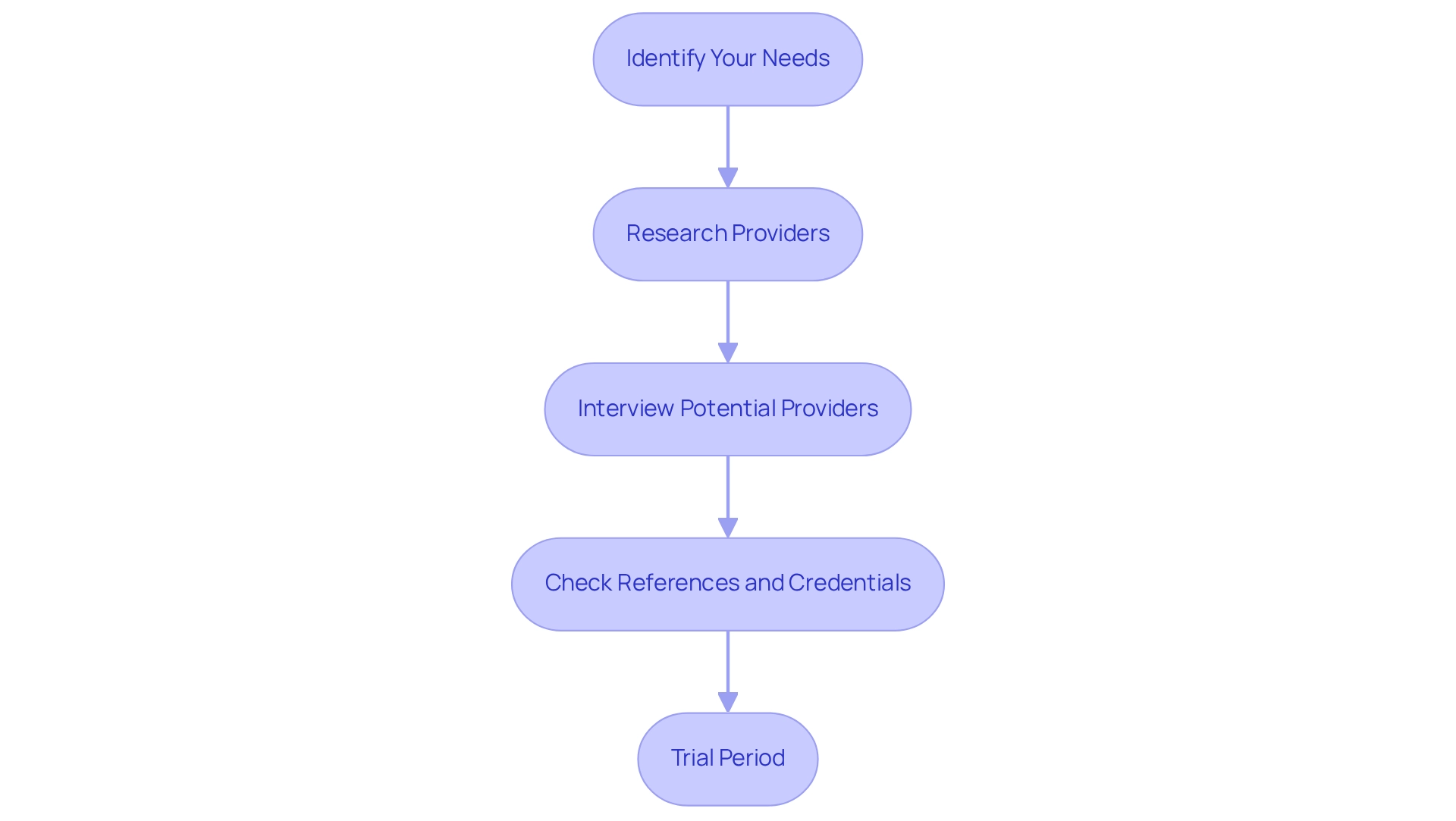
Understanding the Costs of Respite Care: Budgeting for Support
The costs of respite care can vary significantly based on several key factors that matter to families seeking support:
-
Type of Care: In-home care typically ranges from $15 to $35 per hour, offering a flexible option for families. In contrast, facility-based services can be considerably more expensive, with daily rates between $200 and $300. At Best Nurses Registry, we provide tailored home services that specifically address the needs of seniors, enhancing their quality of life and autonomy.
-
Duration of Service: The length of assistance required can influence pricing, as short-term stays often have different rates compared to long-term arrangements. Understanding these differences is essential for effective budgeting, especially when evaluating the customizable assistance options available through Best Nurses Registry.
-
Location: Geographic location plays a significant role in cost variations. Prices can differ widely depending on regional demand and the availability of services, making a localized approach to budgeting necessary. Best Nurses Registry is committed to offering adaptable home health support solutions tailored to individual needs.
-
Insurance and Funding: Families should explore various financial support options, including long-term support insurance, Medicaid, and local programs designed to help offset respite service expenses. Best Nurses Registry accepts most long-term support insurances directly on your behalf, simplifying the process for families. Understanding these policies is crucial, as nearly one-third of Americans have provided assistance for an elderly, ill, or disabled family member, highlighting the importance of being aware of available financial options.
To engage with Best Care Nurses Registry, families can follow three simple steps:
- Call to speak with our friendly staff to discuss your needs and answer any questions you may have.
- We’ll discuss your circumstances with you or your family member and obtain a plan from your physician that ideally addresses your requirements.
- We will refer compassionate support providers whom you choose to work with.
Recent analyses indicate that in-home assistance services, including home health aides and homemaker services, have seen varying increases in costs, with homemaker services rising by 10% in 2024. This trend underscores the necessity for families to collectively assess their financial situations, including savings and home equity, to manage costs effectively. As Adams noted, “They find themselves in a situation where they need to find money immediately,” reflecting the urgency many families face.
Furthermore, two-thirds of home service agencies now charge the same rate for both home health aides and homemaker services, indicating a shift in pricing strategies within the industry.
As caregivers navigate the complexities of services, understanding the definition of respite care is crucial. Expert opinions emphasize the importance of thorough budgeting and comprehending the expenses linked to various types of assistance. By considering these factors and engaging with Best Care Nurses Registry, families can make informed decisions that best suit their needs and financial situations. Once our documentation is received, assistance can commence promptly, ensuring that families receive the support they need without unnecessary delays.
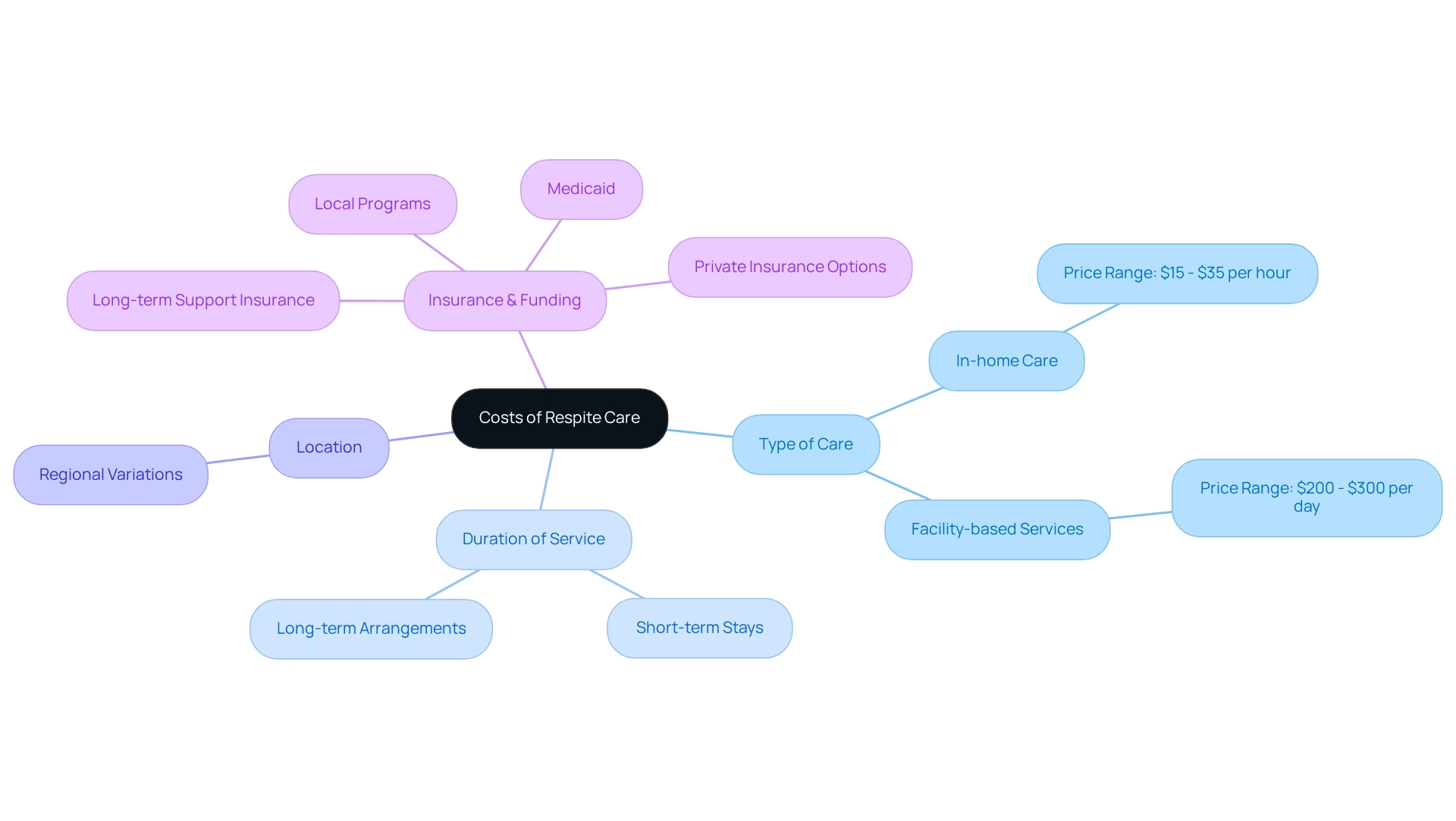
Overcoming Challenges in Accessing Respite Care: Tips and Strategies
Care providers often face numerous challenges when seeking relief services, which can significantly impact their ability to provide effective assistance. Understanding these obstacles is the first step toward finding solutions that work. Here are some common hurdles and strategies to overcome them:
-
Limited Availability: The demand for respite care services often exceeds supply. To enhance your chances of finding available services, it’s important to research local providers early. Consider flexible scheduling options, such as weekday or off-peak hours. Engaging with community resources can also help uncover lesser-known providers that may be able to assist you.
-
Financial Limitations: Many individuals providing support encounter financial challenges when seeking temporary assistance. Exploring funding options—like government assistance programs, grants, or sliding scale fees offered by local agencies—can help alleviate some of this burden. Notably, 93% of facilities accept cash or self-payment, providing additional options for those without insurance coverage. The Best Care Concierge Program at Best Care Nurses Registry connects individuals with a network of professionals, including financial advisors, who can assist in navigating these financial challenges. As Matthew Clem, a licensed nurse, notes, “Providing assistance often adversely affects the providers’ financial resources,” highlighting the importance of financial planning in pursuing relief support.
-
Guilt or Stigma: Caregivers may struggle with feelings of guilt or stigma about seeking relief services. It’s vital to recognize that utilizing these services is a responsible choice that ultimately benefits both the provider and the recipient. Open communication with family members about the need for support can help normalize the conversation and alleviate feelings of guilt.
-
Navigating Services: The process of finding and securing temporary support can feel overwhelming. Utilizing local agencies or online resources can simplify this journey. Many organizations offer listings of temporary care providers, making it easier to connect with services that meet your specific needs.
-
Overcoming Barriers to Access: Caregivers frequently report increased stress and anxiety due to the demands of caregiving, with 88% of veterans’ caregivers indicating heightened emotional strain. Addressing these barriers requires a proactive approach. Seeking peer support groups or counseling services can provide emotional relief and practical advice. Families that utilize temporary care services often report reduced stress, increased resilience, and stronger social connections, underscoring the benefits of these services.
-
Technology Solutions: The integration of telehealth and mobile treatment services can help overcome some obstacles to obtaining temporary support, particularly in underserved areas. These technological advancements can enhance access to essential resources and support, making it easier for caregivers to find the help they need.
By understanding these challenges and employing effective strategies, care providers can navigate the complexities of accessing respite services more effectively. This ensures they receive the support necessary while continuing to deliver quality assistance to their loved ones. Remember, we’re here for you, and your comfort is our priority.
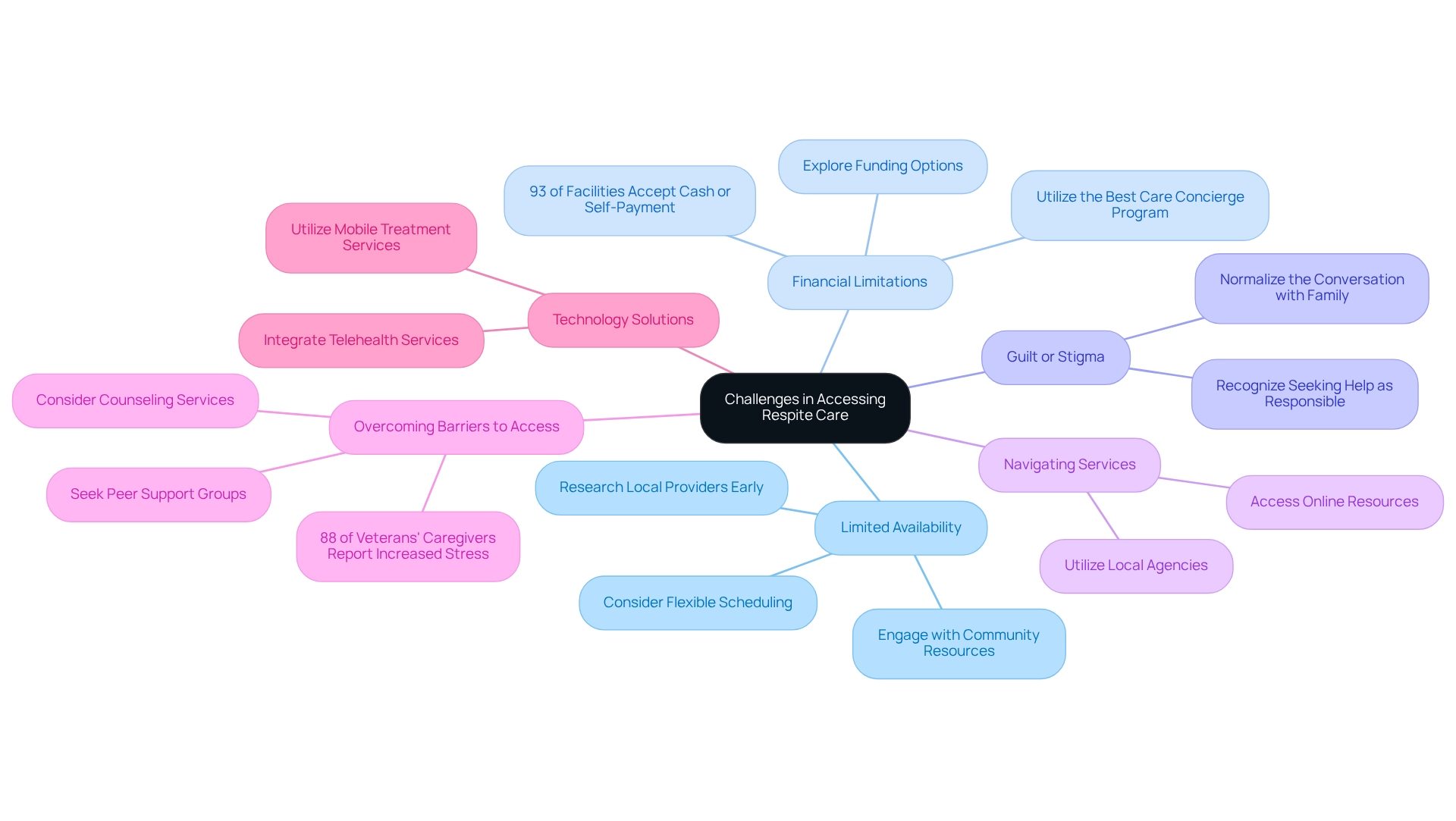
Key Takeaways: Embracing Respite Care for Better Caregiving
Respite support acts as a vital lifeline for those providing assistance, offering essential breaks that significantly enhance the well-being of both caregivers and those they care for. Here are some key points to consider:
-
Flexibility and Personalization: Respite care is inherently flexible, allowing for customization to meet the unique needs of each caregiver and care recipient. At Best Care Nurses Registry, we focus on individualized caregiver pairing services, ensuring that you receive empathetic home health assistance tailored to your specific situation.
-
Variety of Options: Understanding the various forms of respite support available is crucial for making informed choices. Options may include in-home assistance, adult day programs, or short-term residential stays, each designed to provide relief while ensuring continuity of support. Our team at Best Care is dedicated to discussing your needs and exploring all types of services we provide to find the right fit for you and your loved one.
-
Long-Term Health Benefits: The advantages of temporary support extend far beyond immediate relief. Studies show that individuals who utilize temporary relief services report better overall health, lower stress levels, and an improved quality of life. This is vital, as caregiver well-being directly influences the quality of assistance provided to recipients. With Best Nurses Registry, you can breathe easier knowing that your loved one is safe and happy in the hands of skilled professionals.
-
Encouragement to Seek Assistance: Caregivers should actively seek relief options without hesitation. Accessing support is not only beneficial for their own health but also essential for maintaining the high standards of care that their loved ones deserve. Call us at (888) 203-2529 to speak with our friendly staff about how we can assist you.
-
Effect on Support Provider Health: Statistics indicate that individuals who engage in relief services experience reduced levels of depression and anxiety, highlighting the importance of prioritizing their own well-being. Notably, 21% of non-caregivers using Facebook follow friends’ personal health experiences, underscoring the social aspects of caregiving and the significance of community support. This is particularly relevant in 2025, as the demands on caregivers continue to grow.
-
Research Insights: A case study titled “Construct Validity in Research on Temporary Relief” emphasizes the importance of selecting appropriate outcomes and utilizing multiple assessment methods in research on temporary relief. This highlights the necessity for creative strategies in temporary support, as mentioned by Steven H Zarit, who indicated that reliance on randomized controlled trials (RCTs) limits the scope of research that can be performed in community-oriented environments.
In summary, adopting the definition of respite care serves as a proactive measure toward improved caregiving. It enables caregivers to rejuvenate, ultimately resulting in better health outcomes for both themselves and those they support. At Best Nurses Registry, we are dedicated to offering personalized home health solutions that ensure the safety and happiness of your loved ones at home.
Additionally, hear from our satisfied clients about their experiences with Best Care Nurses Registry, which further underscores our commitment to quality care.
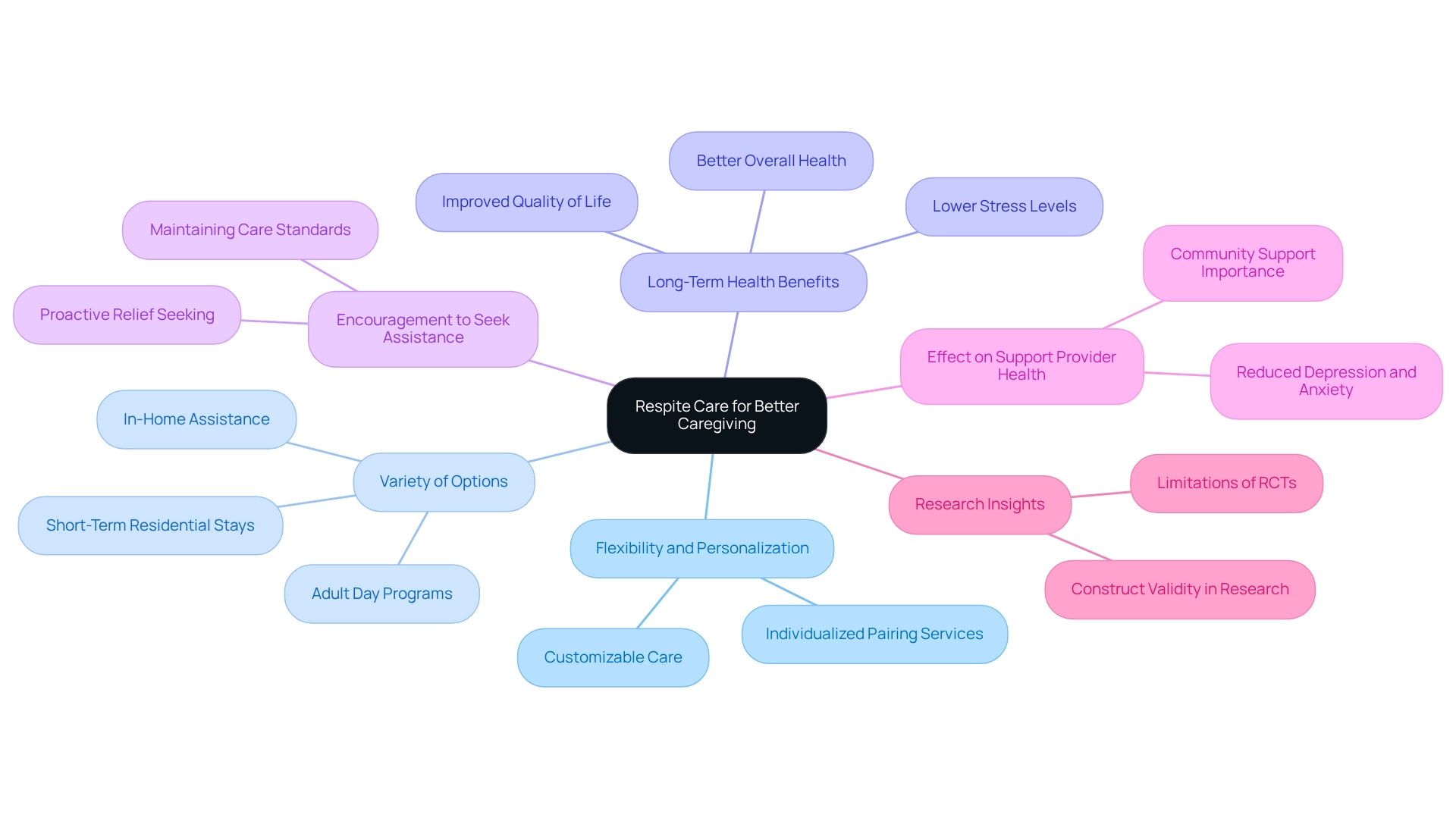
Conclusion
Respite care is not merely a temporary solution; it serves as a vital support system that enhances the well-being of both caregivers and care recipients. By offering flexible options tailored to individual needs, respite care enables caregivers to take essential breaks, which helps prevent burnout and promotes their own health. With a variety of services available, including in-home care, adult day programs, and facility-based options, families can find the right fit for their unique circumstances.
The many benefits of respite care extend beyond immediate relief, fostering improved health outcomes and stronger family relationships. Caregivers who utilize these services often report reduced stress levels and an enhanced quality of life, which in turn positively impacts the care they provide. As the landscape of caregiving evolves, understanding and accessing respite care becomes increasingly important.
Ultimately, seeking respite care is a proactive choice that empowers caregivers to maintain their well-being while ensuring their loved ones continue to receive high-quality support. Embracing this essential service can lead to healthier, happier families, reinforcing the message that prioritizing self-care is vital in the caregiving journey. If you find yourself in need, reaching out to a dedicated provider like Best Care Nurses Registry can help you discover personalized care solutions tailored to meet specific needs.
Frequently Asked Questions
What is respite care?
Respite care is a short-term service designed to provide temporary relief for primary caregivers, allowing them to take breaks while ensuring that their loved ones continue to receive necessary support.
How long can respite care services be arranged for?
Respite care can be arranged for varying lengths of time, from a few hours to several weeks, depending on the specific needs of both the caregiver and the individual receiving help.
What types of respite care services are available?
Respite care services can be categorized into four main types: In-Home Respite Assistance, Out-of-Home Respite Support (such as adult day centers), Facility-Based Relief Services (like assisted living or nursing homes), and Emergency Respite Assistance for unexpected situations.
What are the benefits of in-home respite assistance?
In-home respite assistance allows caregivers to take breaks while ensuring their loved ones are comfortable at home. It has been shown to enhance the emotional well-being of both caregivers and recipients.
How do out-of-home respite services benefit participants?
Out-of-home respite services, such as adult day centers, provide enriching activities and social interaction, which can significantly benefit the emotional health of participants.
What is the significance of emergency respite assistance?
Emergency respite assistance provides prompt help for caregivers facing unforeseen challenges, ensuring that support needs are met without delay.
How does utilizing respite services impact caregiver well-being?
Approximately 40% of caregivers report enhanced well-being after utilizing respite services, with many experiencing lower stress levels and improved social connections.
What payment options are available for respite care services?
Best Care Nurses Registry offers flexible payment options, accepting payments from various sources, including long-term support insurance and private pay.
How can I learn more about respite care services from Best Care Nurses Registry?
For more information or to schedule a consultation, you can contact Best Care Nurses Registry at (888) 203-2529 to discuss your needs and develop a personalized support plan.











